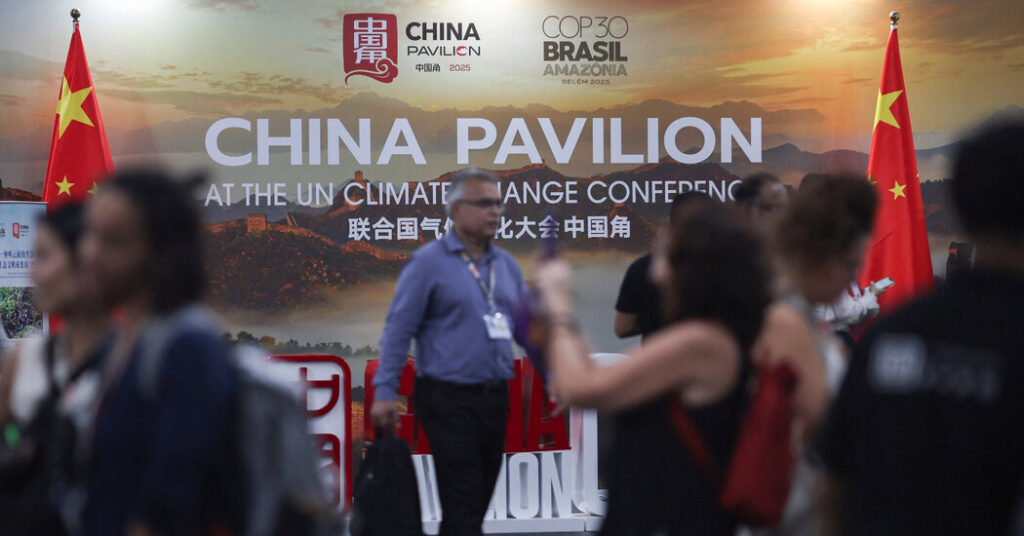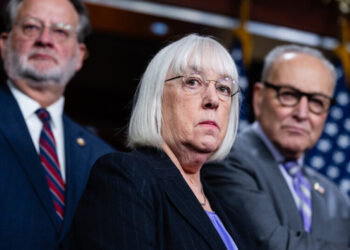‘Ask a Correspondent,’ with Somini Sengupta
As I mentioned last week, I find it striking how little the climate crisis comes up in public discourse these days. But I was encouraged to see the high level of interest from readers after we called for your questions. So many of you sent thoughtful queries from all corners of the globe. Thank you.
My colleague Somini Sengupta, our international climate reporter, answered some of the most frequently asked questions below; you can also watch my conversation with her in the video above.
Why are people like President Trump so invested in abandoning green policies? Why do countries like China have more of an interest in them? — Domantas Miklovis, Sweden
One reason is that the U.S. has a lot of oil and gas to sell — it’s the world’s biggest oil producer and exporter of natural gas. China has relatively little compared to its population. But China controls the mining and processing of the minerals necessary for the green transition. It also has the manufacturing prowess to make renewable energy equipment at scale.
We’re witnessing a race between the world’s two superpowers to define how the global economy is powered. That race is driven not just by climate change. The U.S. and China are pursuing energy strategies defined mainly by their economic and national security concerns. In both countries, there are entire industries at stake, and both countries want energy autonomy.
The growth of renewable energies and technologies like solar panels and electric vehicles depends on the exploitation of minerals like cobalt and coltan, which are nonrenewable. Is this approach sustainable? — Robert Enowegbe, Cameroon
Just as oil and gas are extractive, so too are many of the components of renewable energy infrastructure. Extracting a mineral like lithium, which is used in batteries that power electric cars, has environmental and social costs, as does extracting oil. Those costs can be minimized, however. Our governments can enforce laws against labor exploitation or the contamination of waterways. We have the power to limit the damage.
Also, keep in mind that we don’t have to keep extracting stuff indefinitely. There are ways to recover waste material from batteries. But recycling rates are still really low. The question now is how soon that will improve.
As a psychotherapist, I come across climate anxiety in the therapy room. The issue seems too big, and people struggle with helplessness. What is the best thing an individual can do to help? — Emi Noyan, Britain
I’d love to hear from you what the research says about what works and what doesn’t!
It’s understandable that people can grow really pessimistic. I hear this often. I feel it, too.
At the same time, I can tell you that I meet people around the world who are putting their creativity and their skills to work to fix things in their communities. The world’s most vulnerable people, especially, are doing everything they can. They don’t have a choice!
There are a few practical things those of us who live in industrialized countries can do. First, drive less in gasoline-burning cars. Second, throw away less food. Third, eat less meat and dairy. If you live in a democracy, you can vote for those who represent your values.
Also, it wouldn’t hurt to go out and seek some delight. Listen to music with other people, or walk under some trees. Dance. Feed people. Do whatever makes sense to you to improve things in your community, so that you feel less isolated.
Assuming that in Trump’s second term the U.S. withdraws from all actions aimed at reducing climate change, how bad will the damage be? Would any successors be able to bring us back to the hopeful projection of only 1.5 degrees Celsius of warming? Or would the damage be irreversible? — Anmoli Kamath, India
It will be tough, though not strictly impossible, to keep the global average temperature rise to only 1.5 degrees Celsius above preindustrial levels. (The world has already warmed about 1.3 degrees Celsius.) There are three things to keep an eye on.
First, in the U.S., for the first time in a long while, emissions are rising, in part because of A.I., which is extremely energy-intensive. If tech companies meet their gargantuan new energy demands with fossil fuels, that may be a significant setback.
Second, if China starts reducing its emissions quickly, that will go a long way toward reducing global emissions. (China could do this if it reduced coal burning.)
Third, if large emerging economies like India, Indonesia and Mexico can meet their growing energy demands with renewables instead of fossil fuels, and leapfrog to electric vehicles instead of gasoline-burning cars, that too will go a long way toward reducing growth in their emissions.
So a lot of things would need to happen in order to stay within relatively manageable levels of global warming. The U.S. reversal certainly doesn’t help, but it’s not the only factor.
Interested in providing feedback on this newsletter? Take our short survey here.
MORE TOP NEWS
A rift over the Epstein files
Representative Marjorie Taylor Greene has long been one of the most combative Republicans in Congress and a close ally to Trump. But their relationship is in turmoil as the House prepares to vote this week on a measure that would compel the Justice Department to make public files related to the convicted sex offender Jeffrey Epstein.
Trump on Friday announced he was cutting ties with Greene, calling her “wacky” and a “traitor” after she criticized his handling of the files. Trump also issued a not-so-veiled threat about her seat in Congress — a public warning to any House Republican who might be considering joining Greene in supporting the measure. Yesterday, Greene said in an interview that she still supported Trump, but vowed not to back down.
OTHER NEWS
-
Britain rolled out a new, tougher system for handling asylum seekers.
-
China escalated its diplomatic feud with Japan by sending Coast Guard ships near disputed islands and warning Chinese students in Japan about safety risks.
-
Protesters held demonstrations in more than 50 cities across Mexico to vent frustration at the government’s handling of corruption and violent crime.
-
Voters in Chile went to the polls in a presidential election dominated by candidates’ promises to crack down on crime and immigration.
-
Women in India who face long-term heat exposure in workplaces and homes say it’s taking a heavy toll on their health and income.
-
At the BBC, seven days of silence turned a controversy over the editing of a speech by Trump into a major crisis. Here’s how it snowballed.
-
Many Kenyan workers are abused abroad. The president’s family and his allies profit.
SPORTS
Tennis: Jannik Sinner beat Carlos Alcaraz to win the ATP Tour Finals. Here are the highlights.
Football: Why have so many of the biggest countries not qualified for the World Cup in 2026?
Golf: Rory McIlroy clinched his seventh Race to Dubai title despite a playoff loss at the DP World Tour Championship.
ROOM OF THE DAY
The Oval Office study
— The small, private room in the White House has been used by previous presidents to focus on work or take calls. But in the Trump era, the room has changed. Trump takes foreign leaders there to show off Trump-themed merchandise.
MORNING READ
Pope Leo XIV has welcomed movie stars and filmmakers to the Vatican and urged them to be “witnesses of hope, beauty and truth.” Among those attending the special audience on Saturday were Judd Apatow, Cate Blanchett and Spike Lee.
Leo praised cinema’s “capacity to amaze” and said more should be done to protect movie theaters, which are facing “a troubling decline,” a statement that drew applause. Left unspoken at the event were differences over social issues such as abortion and same-sex marriage. Still, the celebrities seemed to appreciate Leo’s view that movies should show the world as it is, with its pain and its poetry. Read more.
AROUND THE WORLD
How they’re getting fit … in South Korea
Bikers in shorts and colorful jerseys have long been a common sight in the parks and on the trails along the Han River in Seoul. Recently, runners in Nike hats, Oakley sunglasses and jogging vests have also been hitting the riverbanks.
Once a niche pastime in South Korea, running is now one of the most popular sports in the country, according to government data. The number of organized runs has soared in the past few years, and sales of running shoes have exploded. Slots for races, like the JTBC Seoul Marathon this month, which crossed the Han three times, fill up quickly.
A desire for community, especially among people in their 20s and 30s, is helping to fuel the boom, according to a study by Chosun University. Another key reason: It’s easy to get started.
I hopped on the bandwagon last year after hearing at a college reunion that several of my friends had started running. We have an active group chat of five in which we upload pictures from our runs. Within half a year of joining the group, I ran my first 10-kilometer race. Two months ago, I finished my first half marathon. — Jin Yu Young, who reports on South Korea from Seoul
RECOMMENDATIONS
Travel: These four New Zealand lodges, many in remote spots, offer luxury with a sense of place.
Watch: With “Predator: Badlands” in theaters, here’s the back story on the franchise.
Exercise: Is it a bad idea to work out before bed? Here’s what the experts say.
Compete: Take our Flashback history quiz.
RECIPE
A specialty from the Sichuan Province of China, dan dan noodles are a bowl of contentment. In the Western diaspora, the dish is associated with a few essentials, namely chile oil and sesame paste, but you can also add preserved vegetables.
WHERE IS THIS?
Where are these apartments?
TIME TO PLAY
Here are today’s Spelling Bee, Mini Crossword, Wordle and Sudoku. Find all our games here.
You’re done for today. See you tomorrow! — Katrin
We welcome your feedback. Send us your suggestions at [email protected].
Katrin Bennhold is the host of The World, the flagship global newsletter of The New York Times.
The post Your Questions About Climate Change, Answered appeared first on New York Times.




